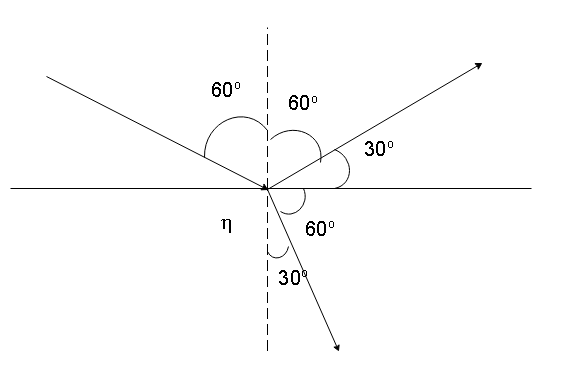Question
Question: A beam of light is incident on a glass plate at an angle of incidence \[60^\circ \]. The reflected r...
A beam of light is incident on a glass plate at an angle of incidence 60∘. The reflected ray is completely polarised. If a ray of light incident at angle of 37∘, then the angle of refraction will be:
Solution
If the reflected ray of light is completely polarized then the ray of light that is refracted will be perpendicular to the refracted ray of light. We can use this condition to determine the refractive index of the medium which we will then use to determine the angle of refraction when the light ray is incident at 37∘.
Formula used: In this solution, we will use the following formula:
Snell's law: μ1sinθ1=μ2sinθ2 where μ1 and μ2 are the refractive index of two different mediums and θ1 and θ2 are the angles made by the ray of light with the normal to the surface of refraction.
Complete step by step answer
Whenever a ray of light interacts with an interface, some part of it is reflected, while some part of it is refracted in the other medium. If the reflected ray is perpendicular to the refracted ray only then will the reflected ray be completely polarized. Let us start by drawing a diagram of this situation.

As we can see, for the refracted ray to be perpendicular to the reflected ray, the refracted ray must form an angle of 30∘ with the normal.
Using Snell’s’ law we can write
μ1sinθ1=μ2sinθ2
Since the first medium is air, we can write
1sin60∘=μ2sin30∘
123=μ221
Which gives us the refractive index of the medium as,
μ2=3
Now that we know the refractive index of the second medium, if the ray of light is incident at 37∘, the angle of refraction can be calculated using Snell’s law as
1sin37∘=3sinθ2
Which gives us,
sinθ2=533
Hence the angle of refraction is,
∴θ2=sin−1(533)
Note
The relation of reflected and refracted rays is only provided to us to determine the refractive index of the second medium. When the light ray is incident at 37∘ there is no direct relation between the angle of reflection and the angle of refraction and the reflected light will also not be completely polarised.
